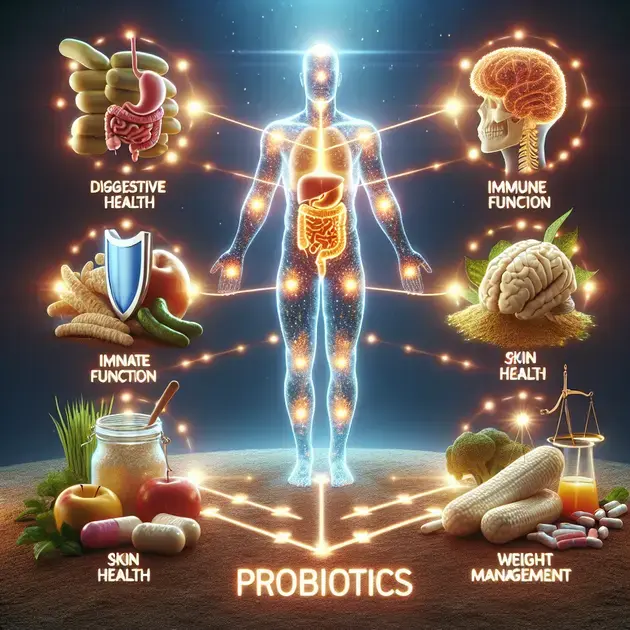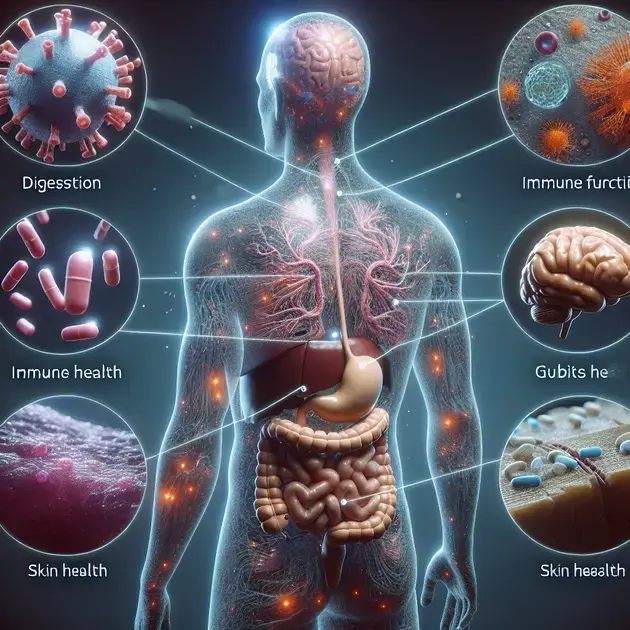Have you ever wondered about the functions of probiotics and how they can benefit your health? In this blog post, we will be exploring the various roles that probiotics play in maintaining a healthy gut and supporting overall well-being.
Recent studies have shown that probiotics can help improve digestion, boost the immune system, and even contribute to mental health. Join us as we delve into the fascinating world of probiotics and discover the amazing benefits they have to offer.

Benefits of Probiotics for Digestion
Probiotics are live bacteria and yeasts that are good for your health, especially your digestive system. They help restore the natural balance of bacteria in your gut, promoting better digestion. One way to benefit from probiotics for digestion is by consuming probiotic-rich foods such as yogurt, kefir, sauerkraut, and kimchi. These foods can easily be incorporated into your daily diet.
Another way to improve digestion with probiotics is by taking probiotic supplements. You can find a variety of probiotic supplements in health food stores or online retailers. Look for products that contain a mix of different probiotic strains to maximize digestive benefits.
If you prefer a more personalized approach, you can consult with a healthcare provider or a nutritionist to determine the best probiotic regimen for your digestive health. They can recommend specific probiotic strains and dosage based on your individual needs.
In addition to aiding digestion, probiotics can also help alleviate symptoms of digestive disorders such as irritable bowel syndrome (IBS) and bloating. Incorporating probiotics into your daily routine can lead to overall improved gut health and better digestion.
Enhancing Immune Function with Probiotics
The connection between probiotics and immune function is well-established, as a large portion of the body’s immune system is located in the gut. Probiotics play a crucial role in supporting immune function by maintaining a healthy balance of gut bacteria.
To enhance immune function with probiotics, consider consuming immune-boosting probiotic strains such as Lactobacillus and Bifidobacterium. These strains have been shown to stimulate the body’s immune response and help prevent infections.
Incorporating probiotic-rich foods like yogurt, kombucha, and miso into your diet can provide a natural source of immune-boosting probiotics. You can also explore probiotic supplements that are specifically formulated to support immune health.
For individuals looking to strengthen their immune system, a daily probiotic regimen can be beneficial. Consistent intake of probiotics can help modulate immune function and reduce the risk of infections, particularly during cold and flu season.
Consult with a healthcare provider or immune health specialist to determine the best probiotic approach for enhancing your immune function. They can recommend specific strains and dosages tailored to support your immune system.
The Surprising Link Between Probiotics and Mental Health
Emerging research has highlighted the connection between probiotics and mental health, suggesting that gut health may impact brain function and mood. Probiotics can influence the production of neurotransmitters like serotonin, which play a role in regulating mood and emotions.
To explore the link between probiotics and mental health, consider incorporating mood-boosting probiotic strains such as Lactobacillus helveticus and Bifidobacterium longum into your diet. These strains have been associated with improved mood and stress management.
Probiotic supplements containing specific strains targeted for mental well-being are available in the market. These formulations are designed to support cognitive function, reduce anxiety, and enhance overall mental health.
In addition to dietary sources of probiotics, lifestyle factors such as exercise and stress management can also influence mental well-being. Combining probiotic-rich foods with a healthy lifestyle can have a positive impact on both gut health and mental health.
Consult with a mental health professional or nutritionist to explore how probiotics can support your emotional well-being. They can provide guidance on incorporating probiotics into your routine to promote a healthy gut-brain connection.

The Role of Probiotics in Gut Health
Probiotics play a crucial role in maintaining gut health by promoting a healthy balance of good bacteria in the digestive system. These live microorganisms can help improve digestion, boost the immune system, and reduce inflammation in the gut. Studies have shown that probiotics can also aid in the treatment of various gastrointestinal conditions such as irritable bowel syndrome, inflammatory bowel disease, and diarrhea.
One of the key benefits of probiotics in gut health is their ability to restore and maintain a healthy gut microbiome. By introducing beneficial bacteria into the gut, probiotics can help prevent the overgrowth of harmful bacteria that can lead to digestive issues. This balance is essential for overall gut health and can contribute to improved nutrient absorption and better overall well-being.
Furthermore, probiotics are believed to play a role in supporting mental health, as there is a strong connection between the gut and the brain. The gut microbiome can influence brain function and mood, and by promoting a healthy gut environment, probiotics may help support mental health and reduce the risk of conditions such as anxiety and depression.
Overall, incorporating probiotics into your daily routine through diet or supplements can have a positive impact on gut health and overall well-being. By maintaining a healthy balance of gut bacteria, you can support digestion, boost your immune system, and potentially improve mental health.
Probiotics: A Natural Solution for Skin Health
When it comes to skin health, probiotics can offer a natural solution to various skin issues. The balance of bacteria in the gut can affect the health of your skin, and by incorporating probiotics into your diet, you may see improvements in skin conditions such as acne, eczema, and rosacea. Probiotics can help reduce inflammation in the body, which can contribute to clearer and healthier skin.
Probiotics can also aid in skin hydration and overall skin barrier function. By promoting a healthy gut microbiome, probiotics can support the skin’s natural ability to retain moisture and protect against external aggressors. This can lead to a more radiant complexion and improved skin texture.
In addition to their direct impact on skin health, probiotics can also support the immune system, which plays a crucial role in maintaining healthy skin. By addressing gut health with probiotics, you can help bolster your body’s natural defense mechanisms, which can have a positive impact on skin health and overall immunity.
Overall, probiotics offer a natural and effective solution for improving skin health from the inside out. By nourishing your gut with beneficial bacteria, you can support your skin’s health and appearance, leading to a clearer, more radiant complexion.
Probiotics and Weight Management: What You Need to Know
When it comes to weight management, probiotics can play a supportive role in promoting a healthy metabolism and potentially aiding in weight loss. By maintaining a balanced gut microbiome, probiotics can help regulate the body’s energy balance and support the efficient breakdown of nutrients.
Studies have shown that certain strains of probiotics may be associated with weight loss and a reduction in body fat. These beneficial bacteria can influence factors such as appetite regulation, fat storage, and inflammation, all of which can impact weight management and overall body composition.
Furthermore, probiotics can support digestive health, which is essential for proper nutrient absorption and metabolism. A healthy gut microbiome can help optimize digestion and nutrient uptake, which can contribute to overall weight management and body function.
It’s important to note that while probiotics can be a helpful supplement to a healthy lifestyle, they are not a magic solution for weight loss. Incorporating probiotics into your diet along with regular exercise and a balanced diet can support your weight management goals and overall well-being.
Conclusion
In conclusion, probiotics play a vital role in maintaining gut health by nurturing a healthy balance of beneficial bacteria essential for digestion, immune system reinforcement, and gut inflammation reduction. Furthermore, incorporating probiotics into your daily routine can improve gut health, support digestion, enhance the immune system, and potentially enhance mental well-being.
When it comes to skin health, probiotics offer a natural solution to various skin conditions by reducing inflammation, improving skin hydration, and supporting the skin’s natural barrier function. By promoting a healthy gut microbiome, probiotics contribute to clearer and healthier skin, showcasing a more radiant complexion and improved skin texture.
Regarding weight management, probiotics can aid in promoting a healthy metabolism, potentially supporting weight loss by influencing factors like appetite regulation, fat storage, and inflammation. While probiotics are not a standalone solution for weight loss, when combined with exercise and a balanced diet, they can be a valuable addition to support overall weight management and well-being.



